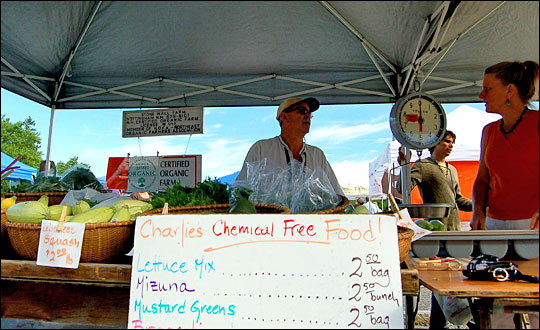In Checkout Line, Lou Bendrick cooks up answers to reader questions about how to green their food choices and other diet-related quandaries.
Dear Checkout Line,
Any suggestions on how to ask local farmers (or the person selling the goods at the farmers’ market who might not be the actual grower) if the produce was treated with Sevin or some other noxious but commonly used poison?
Pam Ruedige
Dear Pam,
A question about asking questions! How delightfully meta!
As you probably know, many small, local growers have neither the time nor money for organic certification. The good news is that they might very well be using sustainable, organic growing methods anyway. The bad news is that they might not, so we really do have to pipe up and ask questions. This is where things can get uncomfortable. In essence what we are asking is “Are you poisoning me?” And while food questions are not quite as loaded as “Are you still beating your wife?,” the mere inference of wrongdoing might make a farmer a bit defensive.
Luckily, sensible and sensitive persons like you realize that how you ask is as important as what you ask! To help us approach such questions with finesse, I rang up Anna Post, none other than the great-great granddaughter of etiquette doyenne Emily Post.
“It’s all about the how,” Post told me. “That’s why I have a job.”
Luckily for all of us, Post is not only an author and spokesperson for the Emily Post Institute, but also a big-time fan of local organic food! She likes to put farmers at ease by simply saying, So tell me about your farm.
“Most people I found who participate in those kinds of good practices are very excited to talk to you about it,” she says.
Indeed! But what if you, like me, are a fan of direct questions, such as “Is this stuff organic?”
“It’s fine to ask the direct question,” Post told me. “But your tone of voice will carry your intent. You can use a tone of voice that means that you are checking, rather accusatory.”
“Be nice,” Steve Sando agreed. “You have a right to know, but be nice.”
Sando is the founder of Rancho Gordo, which specializes in New World (indigenous) food, especially sustainably grown heirloom beans. Sando is a regular at farmers’ markets, where people often ask of his beans, Are these organic? In addition to being direct, this question can also be a bit, well, simplistic.
“I would love to talk about it, but people want a yes or no answer,” he says. “It’s not as simple as yes or no. Do you mean certified? Do you mean the way we grow it? “
So what’s Sando’s answer to the is-this-organic question?
“If people are nice, I talk to them about how they’re grown,” he admits. ” If they’re not nice — and I can just tell — then I just say no.”
To sum: We all might do well by adopting an attitude of cheery, enthusiastic curiosity about our food lest we miss out on a heckuva interesting conversation with a farmer!
A few more suggestions: If the person selling the food isn’t the grower and he or she can’t answer your questions, get a phone number. Sando also advises that if the farmer is swamped (say, at a busy farmers’ market) send them an email, call them or come when it’s less busy.
That way both you and the farmer have the time for an unhurried conversation during which you both can listen and be heard. (If only life were always that way!) Because you are savvy enough to know about Sevin, a nasty pesticide, I’ll assume you already have an arsenal of questions. But if you need a little help on what to ask, try this article.
For an excellent list of questions about dairy products and meat, check out the “Questions for a Farmer” Shopping Guide from the Sustainable Table.
Finally, if you are not satisfied with answers you get, here’s how to make a gracious exit: You can say, “Okay, thanks, I’m going to look around,” Post advises, or you can say “I’m sorry but I have a policy to buy organic — let me know if you change.”
I hope this helps, Pam!
With warm regards to you and yours,
Lou Bendrick


